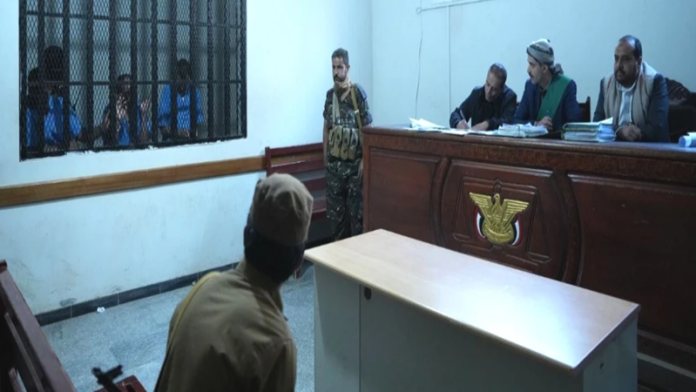Yemen’s Specialized Criminal Court in the capital began hearings Sunday for 21 defendants accused of belonging to a sophisticated espionage network operating under a joint operations room managed by the Israeli enemy (Mossad), the US CIA, and Saudi intelligence. The network, based in Saudi Arabia, spied on Yemen’s military, political, and security infrastructure while recruiting local collaborators.
The trial comes amid heightened regional tensions and ongoing hostilities, highlighting the persistent threat of foreign intelligence operations against Yemen. The case underscores the country’s efforts to protect its sovereignty, military secrets, and strategic decision-making against the Israeli enemy and its allies.
The first session was held under the chairmanship of Chief Judge Yahya al-Mansour, with Prosecutor General Abdullah Zahra and Deputy Prosecutor Sarim al-Din Mufaddal in attendance. The indictment was read, and the 21 defendants were confronted with the charges and evidence.
According to the court documents, the accused collaborated with foreign adversaries hostile to Yemen — namely Saudi Arabia, the United Kingdom, and the United States — through officers from Saudi, British, American intelligence, and the Mossad of the Israeli enemy.
They were provided with encrypted communication tools, geolocation applications, and training in using hidden cameras linked to live broadcast systems.
The defendants supplied the adversaries with sensitive information on government leadership locations and movements, political and military intelligence, and recruited Yemeni citizens to assist in espionage. They installed surveillance cameras that reportedly led to attacks on military, security, and civilian sites.
Charges also include destroying devices and evidence necessary for proving crimes against state security, aiding Saudi aggression and its allies against Yemen, and collecting intelligence on military, political, and media leaders, their residences, meeting locations, and weapons storage sites.
The network reportedly provided the enemy with information about missiles, launch and storage locations, and internal front-line cohesion, receiving financial compensation in return.


















